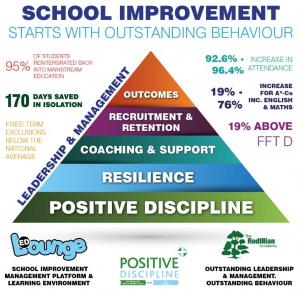Without doubt these are the most challenging times I have experienced in teaching and school leadership. Finding a middle ground between doing what is morally right for the students and keeping the academy from falling into a category due to the new measures is a difficult task.
Students being potentially forced to study more mathematics post 16 when there is already a shortage of teachers in this area only adds to the problem.
Bill Watkins (SSAT) spoke at The Rodillian MAT last month and mentioned that if every mathematics graduate in the UK went into teaching we would still have a shortage. Whilst I embrace challenge and change and my glass is very much half full, I believe that unless we address the very real issue of skill shortages in the teaching profession we may not be able to fulfil all our obligations to our students.
Mathematics is not the only subject that faces this skill shortage. I spend a lot of my time supporting schools and academies across the North and the Midlands and they are all concerned about recruitment. As Sir Richard Branson quite rightly stated: your staff are your biggest asset.
The search for a strong science team to deliver on the Ebacc targets has become, for some, like swimming through treacle. I hear stories of schools having to repeatedly advertise for leaders of English, who are paid on the leadership spine, in order to attract the right candidate. Even then, some of our schools are unable to get a field of candidates needed to take the school forward.
A crisis? I think the changes that are currently going on and are being proposed have certainly made it a lot harder for school leaders to put together the teams they need to provide better life chances for our young people.
For instance who should we be recruiting into teaching? A few years ago, as a leader of teacher training in a school, I asked the universities we worked with to answer one question. In a typical year, what classification of degree do their best trainee teachers obtain before they start their teacher training? Their reply was that the trainees that showed the most promise in being able to motivate, inspire and engage students in their classes all held either a 2:2 or 2:1.
This survey took me 5 minutes to conduct and involved 5 Universities, who all had the same answer. So if my amateur approach to research led to that conclusion, I am not sure how our current drive has evolved. How many of these illusive individuals have we missed out on due to the push for first class honours trainees? I’m sure there are some great teachers out there with a first class degree but there are equally some graduates with a 2:2 that we have potentially missed during this regime.
The solution for leaders in schools and academies is not straightforward nor do we have control over what the current government is doing to our profession, but there are things we can do to give ourselves that chance I spoke about earlier.
My advice will sound quite simple but requires courage and hard work. Let’s make our schools and academies the ones where people want to work. Provide teachers with the atmosphere that promotes learning and allows teachers to teach.
Do not be that school leader who turns a blind eye to poor behaviour and low level disruption. Have a behaviour policy that rewards hard work, teaches students how to behave and the importance of doing so but also, and dare I say it, punishes poorly behaved students.
A system that is used consistently by all staff and those staff feel supported and backed 100% by their senior leaders. Have a system that:
“…enables the pupils to make positive choices about their behaviour.”
Alex Burnham is the Executive Deputy, School Improvement at The Rodillian Multi Academy Trust.
 Positive Discipline is the bedrock of the Rodillian Multi Academy Trust. If you want to find out why we:
Positive Discipline is the bedrock of the Rodillian Multi Academy Trust. If you want to find out why we:
- don’t have a shortage of Mathematics and English teachers
- have attracted science teams that are delivering for our students
- have happy teachers that do not want to leave
- have outstanding leaders that rapidly turn around inadequate schools
- have a passion for school improvement
Visit the Rodillian Academy website and enquire about our PD conferences. Or send us an email at pdenquiries@rodillianacademy.co.uk.










